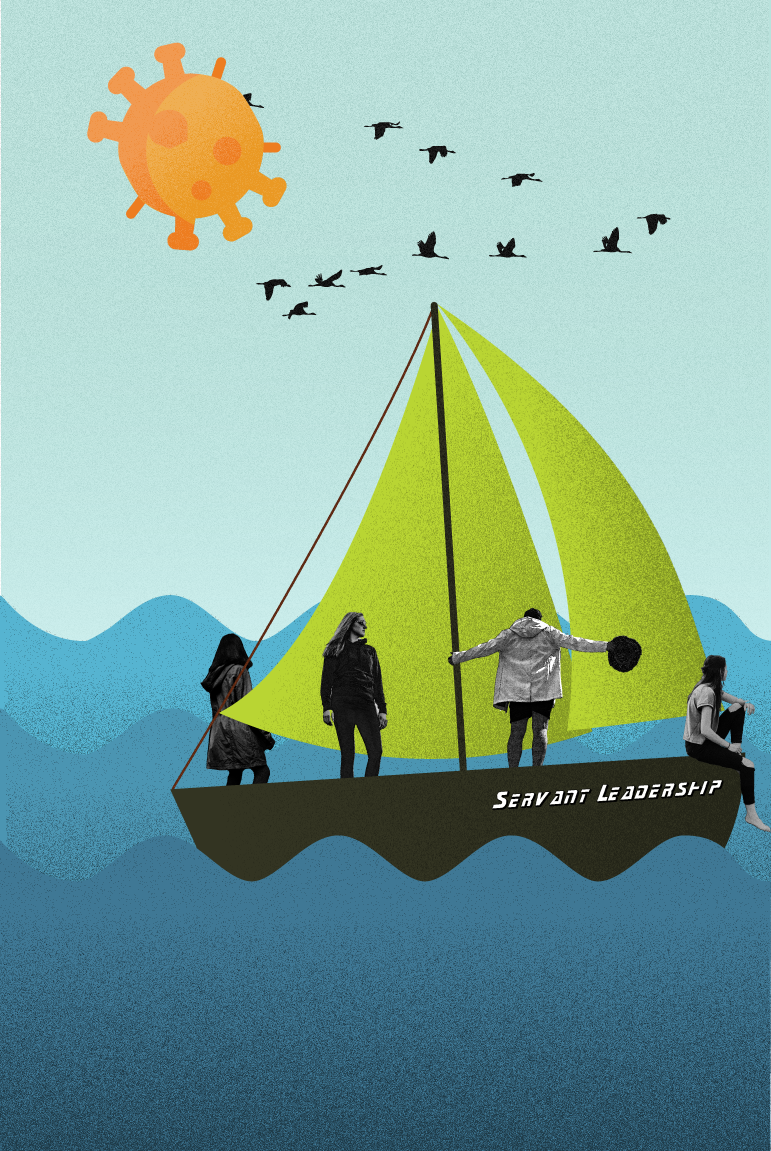 Danica Ross, CCO of Grayling on Creativity in Business and Industry-Hopping Career Transitions
Danica Ross, CCO of Grayling on Creativity in Business and Industry-Hopping Career Transitions
In today’s increasingly competitive and disruptive market, creativity is often seen as a company’s lethal weapon. With creativity on its side, it seems like a business just can’t lose. Do you agree with this creativity-centered philosophy?
Based on what I’ve observed over the past ten years of my career, creativity has become one of the critical qualities for all employees across the board. No matter your industry or role, it’s common that 20% of your performance evaluation is now resting on your creative capabilities—and I’m not so sure I agree with that kind of weight being placed on just one rather abstract quality. It comes down to how we define it—it’s great to place that kind of emphasis on creativity if we’re talking about it in a broad sense.
How should we be defining creativity? Usually, we think of it in the same way we think of its cousins: innovation, imagination, originality, inventiveness. It’s about generating a new idea, insight, or solution. Do you agree with this definition?
What makes me nervous is when we start to define creativity as only “having big ideas.” In startup life, for example, you need big ideas—but you also need people who know how to develop those ideas, and who will keep you on track as you go through your phases of idea and product development. My fear is that when we start to lean too heavily in one direction, we lose the very real skills that people who might not be considered the most “creative thinkers” have and bring to the table.
How does this translate into business?
In any kind of work, it’s really two pieces of the puzzle and two hands that have to work together. Of course, there has to be “The Big Idea.” If you’re in client services on a communications or website platform, you need an idea that will get the client noticed. But, once that idea is in place, you then need the people who can drive it—the ones who keep you on track and within budget. In many fields, that’s a project manager, client manager, or account manager.
While it does depend on what kind of company you are, looking at the size of your company and what stage it’s in can allow you to anticipate your need for creative versus process-oriented people. In companies with multiple hundreds of thousands of employees, not all of those people are “creative masterminds.” And you wouldn’t want that, because there are a lot of trains that just have to keep running on the track—and that’s typically a very different mindset. Generally, the bigger, more stable, and wider a company gets—the more process-oriented people you’re going to need in order to keep it running.
On the other hand, when you’re looking at a startup of maybe three people, then you’re probably going to look for more out-of-the-box thinkers. Particularly at that stage, you’re looking for people who exude future vision and passion. They’re the ones onboarding new team members or attracting investors. These people are going to be the primary evangelists of the company, so you want people who radiate energy, vision, and a future-directed focus.
In companies with multiple hundreds of thousands of employees, not all of those people are “creative masterminds.” And you wouldn’t want that, because there are a lot of trains that just have to keep running on the track
Should we be over-prioritizing creativity in business? How does that look within a company’s team, on a company’s organizational level?
When we consider a the employee based on a holistic level, and we think about the skills we want them to bring, it’s important that we not over-prioritize one skillset above another—particularly if we’re looking at a rubric that we’re rolling out across an entire team.
Of course, you need to have creative thought-drivers in your team in order to succeed. But, you also have to be able to execute on the vision they conceive. That’s a whole different set of skills. Naturally, there are people who have both—ideation and execution—and there are people who have either one or the other.
If we cultivate teams that are all made up of “creative extroverts,” we will have a whole lot of really outspoken people with great ideas—and then perhaps a few people who can go on to actually see some of those great ideas through to fruition.
Companies seem to actively focus on fostering creativity as a way to outperform their competitors, especially when it comes to revenue and market share. Where should the line be drawn in terms of over-prioritizing creativity against other aspects of maintaining a business and its success?
Everyone is trying to outperform their competitor with creativity, but there’s a flipside to that: you also have to be first to the market. It’s great to have the idea first, but you still have to physically get it out there—you need to get the product up and running, and make it available to the market. If you had the idea first, but that’s as far as you got in terms of its execution, you’re not “first to market.” So, it’s really a fine balance.
As CCO of Grayling, how you do you stay innovative and creative in your current position?
It comes naturally because I’m in a career that I love and that constantly inspires me. But that wasn’t always the case.
Right around turning 30, I made a hard career transition from entertainment into corporate America. What makes that kind of transition especially difficult is that corporate America looks at an entertainment resume and says, “I don’t know what to make of this. None of these skills and experiences mean anything.” It was a hard phase for me, and it took a lot of thought and hard work over about a year before I had settled into my new domain. Since then, I’ve been really passionate about helping others find the right career for them. If it’s not the one you’re in, it’s that much harder to find inspiration.
We don’t really stop and ask ourselves: Am I really in the right career?
And how did that work in your situation—how did you figure out which career was right for you?
I was in entertainment for about eight years. I moved from New York to Los Angeles to ultimately make television—I wanted to be a television producer, and I did it. I had a role as the director of new series development for Lisa Kudrow’s company. I helped her company find writers and develop shows to pitch as potential new TV series on networks.
My favorite part of the job was pitch season. I loved when a writer would come to us with just a kernel of an idea, and we would work on developing it into something the networks would want to pick up. We would take that idea and we would say, “Okay, here’s how we’re going to turn this to make it interesting to Fox. And here’s how we’re going to turn it to make it interesting to ABC. Here are the elements we’d need to bring out to make it interesting to NBC.”
I loved that. I thrived in that. It was all my creative and professional juices flowing together. I loved working with Lisa, and I loved her partner, Dan. In reality, I loved everything about where I was working—except what I was doing. Pitch season was just one aspect of the work we did; and when it came time to start shooting the pilot, my interest would just taper off. I wasn’t interested in casting sessions or being on set. I realized very quickly that it wasn’t TV I was really interested in—it was the art of storytelling.
When that job ended, I kind of took a step back. I literally sat down with a pen and paper and wrote down questions like: What do I do every day? What are my daily tasks? Then, I further broke down those tasks into the ones I liked and the ones I didn’t. These are questions that we generally tend to forget about in our day-to-day. We don’t really stop and ask ourselves: Am I really in the right career, or is it just one facet of what I’m doing that’s interesting to me? Would I be happier and more successful if I found something that concentrated more on what I do like, and less on the stuff that I don’t like?
As I talked with friends, they said, “You know, what you’re describing sounds a lot like PR and marketing.”
I went back to my alma mater and called the career center, and I just said, “I graduated almost ten years ago, but this is where I am in life; I’m embarking on a career change and I don’t know anyone in the space I’m trying to get into. I don’t even know how to put together a resume that caters to an industry other than entertainment. Can you help me?” And they did.
They helped me tweak my resume, and they also helped me connect the dots by looking at my experience and translating those tasks and responsibilities, like pitching TV shows, into skills that could be applied outside of the entertainment industry. Then, they gave me a list of other alumni in the area who are in PR and marketing and said, “All of these people have volunteered to help people with their careers. Give them a call.”
At that time, I was lucky enough to have a friend who was also working for a startup that had recently been acquired by Experian. My friend turned to me one day and said, “You have to meet my boss; she’s just really smart. You can pick her brain.”
So, I met her boss; and at the time, it really was just to pick her brain. Then, her boss called me a couple of months later and said, “I have an opening. It’s based in LA. I’d like you to come interview for it.” I interviewed all the way up the chain. Ultimately, what she said was, “I can teach you the mechanics of writing a press release. I can’t teach someone to be smart.” And that’s kind of how it all started.
If you’re looking to transition jobs, I think the key is all about connecting the tissue for the employer between your past experience, and whether it gives you the foundation skills to do what you want to do—even if you might not know all the technical specifications of what that involves.
If you’re looking to transition jobs, I think the key is all about proving to your new employer that you have the foundation skills to do what you want to do by connecting your past experience – even if you might not actually know all the technical specifications of what that involves
What is it like changing industries? You mentioned before you never saw yourself working for corporate America, yet now you love it. How is it transitioning from entertainment to the position you’re in now?
It’s funny because it’s actually almost like I’ve come full circle. The way an agency works is you kind of move up through the chain of being a junior, an account coordinator, to an account executive, and all the way up until you become a managing director or something where you have kind of a P and L below you. You’re responsible for profits and losses. I did that. I ran our San Francisco office and our LA office. I found at that point, that too much of my day was running a business. I wanted to be doing more client work. It was almost like, okay, now I’ve gone too far corporate. I had kind of gotten to a point where like maybe 60% of my day was running a business: looking at profits and losses, managing the team—all the things that go into running an agency. About 40% of it was actually doing communications, which was ultimately what I wanted to do—I went into PR to do communications.
Now, it’s fantastic because I get to work with clients across the organization and really my only remit is providing great client service. My only remit is communications. It’s great, because now I’ve come back to a place where I can really just focus on communications, but at a much higher level than when I started over ten years ago.
Since we’ve talked so much about creativity and how you find yours. What are three things that inspire you?
Nature—and that’s funny, because I’m not a “nature person,” but being outdoors and the fresh air inspire me. When I need to think creatively, I go outside. I get away from my computer, grab a pen and paper, and I go walk around outside. Nature is the primary thing that inspires me.
My kids are another source of inspiration to me. And I mean that not just in the way you would think, that kids are inspirational because you want to be your best for them. They’re the future. They’re the next generation. They interact very differently with technology than I do and ever have. I’m always watching them, observing how they adopt new technologies, platforms, new ways of doing things. They are far more touchscreen-intuitive than keypad and mouse-intuitive. The kids can easily work an iPad, but they cannot figure out a mouse. I get a lot of the inspiration that I go on to apply to the industries we work in just from watching my kids and observing how they interact with different things.
The third thing that inspires me is some of the “gossipier” news, simply because it’s what people are reading. It’s how they’re consuming media. So, I’m always looking at: What are the trending stories? What are people clicking on? How’s that evolving? What’s the theme of the day?
Could you give us one work or life hack that you use to get things done more efficiently?
I’m a big fan of scheduling time for my creative work. My overall schedule is very busy; I have people pop in and onto my schedule frequently. If I know that I’ve got something to do that’s going to require that I get creative (which, like I said, typically involves that I disconnect and spend time alone outdoors)—I will block time for that and schedule it in my calendar, just like I would for a meeting.
You always want to pounce on ideas when you have them. Let’s say we’re launching a new product for a client. There’s nothing worse than sitting down to start thinking about the launch plan only to have someone call you, or start IM’ing you, or come in and say, “Hey, are you free to jump in on this conference call?” Blocking dedicated “creativity time” in my calendar ensures those kinds of interruptions and distractions don’t happen.
Danica Ross is a mentor and mother. She previously worked in the entertainment industry at William Morris Endeavor and Is or Isn’t Entertainment. She is an award winning Public Relations executive whose career has included work for Experian, PayPal, University of Phoenix and more. She is a graduate from the University of Pennsylvania and is currently the Chief Client Officer of Grayling an award-winning integrated communications firm. She specializes in driving strategy for publicly traded global organizations.
Keep up with Danica on LinkedIn and Twitter
Illustration by Justyna Piwowarska



